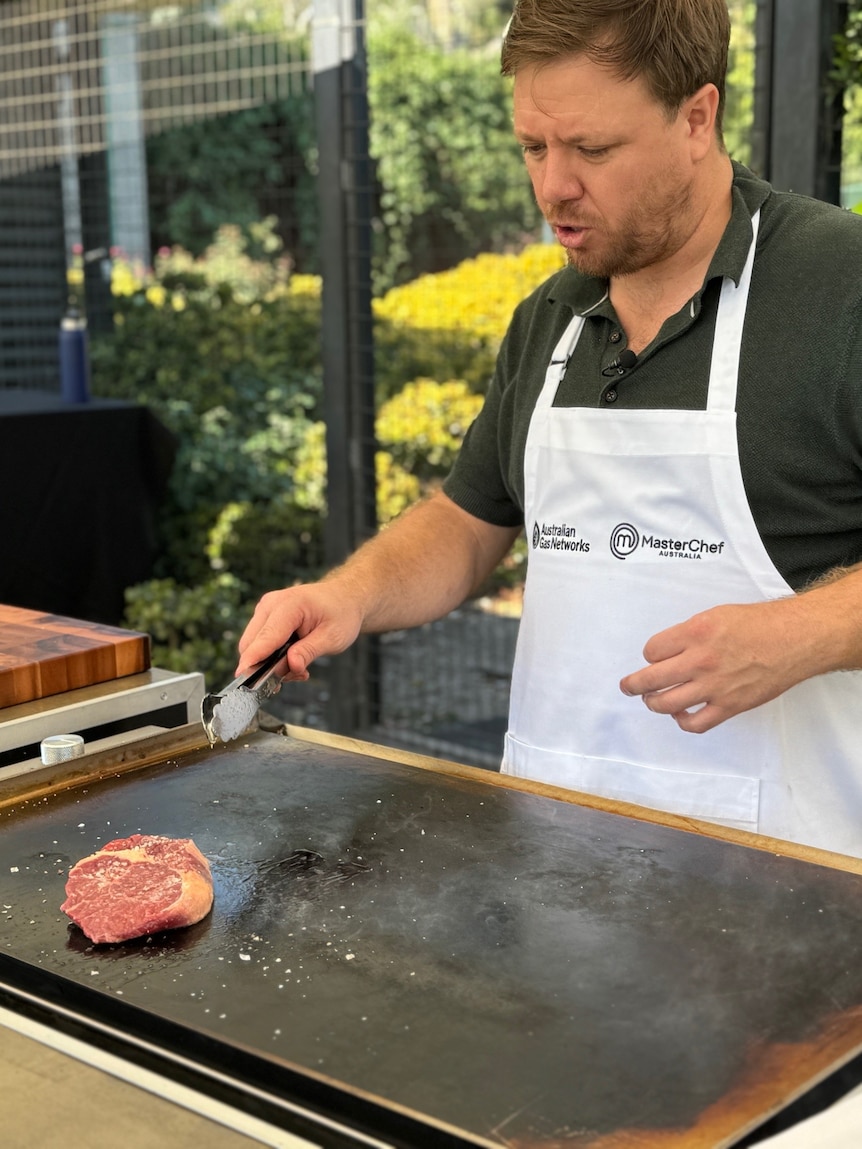Network Ten has been grilled by a Senate inquiry into greenwashing and refused to put a number on a controversial gas sponsorship deal for its successful MasterChef show.
MasterChef came under fire last month when its 16th season aired with official sponsors including the gas grid operator, Australian Gas Network (AGN).
Environmental groups labelled it cynical greenwashing and have since lodged a complaint with the Australian Competition and Consumer Commission (ACCC).
During the prime-time slot, AGN spruiked the benefits of “renewable” gas cooking, including a barbecue powered by AGN-supplied hydrogen, and open flame cooktops powered by biomethane.
Biomethane is the same as traditional gas, however, it is produced using energy from waste. In the case of MasterChef, it’s made from human waste.
The hydrogen was created using fossil gas and used offsets to be considered carbon neutral.
But neither of these options is available outside some small test areas.
Greens senator Sarah Hanson-Young is chairing the greenwashing inquiry and said the sponsorship was about “attempting to increase the social licence” of the gas industry.
“For those who love food, cooking, and MasterChef, it’s concerning that fossil fuel greenwashing from the gas lobby is being force-fed down our throats,” she said.
“Gas is fuelling the climate crisis and it’s bad for our health.”
The Australian Gas Infrastructure Group, which owns AGN, told the inquiry on Friday they want the sponsorship to increase the profile of these alternatives for the gas industry.
“MasterChef is a unique opportunity, it is a fantastic opportunity to promote awareness,” AGIG’s CEO Craig de Laine told the inquiry.
Both AGIG and Network Ten declined to reveal how much the sponsorship cost. They also told the inquiry that viewers were not led to believe that the renewable gas in the MasterChef kitchen was available for their homes.
“There’s no recommendations or suggestions on the MasterChef program that the audience should replicate or can replicate what’s done on the show by our contestants in professional kitchens,” Network Ten’s head of Government and Regulatory Affairs, James Boyce, told the inquiry.
He said they had no plans to change the MasterChef kitchen to electric induction cooking, which is used in many of the franchise’s kitchens overseas.
“Clearly in Australia gas remains one of the most extensively used energy sources, including in commercial and home kitchens,” Boyce said.
“Cooking with a gas barbecue is clearly seen as a celebrated way of Australian life.”
Complaint into sponsorship
Climate group CommsDeclare this week made a formal complaint to the ACCC over the gas claims on the popular cooking show.
“We believe that hundreds of thousands of MasterChef fans are being deceived into thinking that the gas used in the program is good for the planet,” CommsDeclare founder Belina Noble stated.
“The biomethane and grey hydrogen used in the MasterChef kitchen is not renewable, not low emissions, not commercially viable and not available in ordinary Australian homes.”
Last year, the Grattan Institute put out a report on hydrogen that found it would never economically stack up for most Australian households.
“To make hydrogen cheap, you need to make electricity very, very, very cheap because electricity is used to make hydrogen by splitting water into hydrogen and oxygen,” The Grattan Institute’s deputy program director, Alison Reeve, told the ABC last month.
“And the thing is, that when electricity gets really cheap, sure your hydrogen gets cheaper, but that means the case for moving to electricity becomes even more compelling.”
Spate of claims in the spotlight
The Senate inquiry started in March 2023 and is investigating a wide range of “misleading environmental and sustainability claims” across different industries.
It also covers the impact of greenwashing on consumers, and investigating advertising standards and legislative options to deal with the issue.
Friday’s public inquiry also heard from Coles and Woolworths, the packaging industry, and gas majors Santos and Woodside.
Questions to the supermarket giants focused on their labelling of Tasmanian salmon because of environmental concerns about salmon farming and its impact on the local ecosystem.
Clorox, the company that owns the GLAD brand, was another company that appeared before Friday’s inquiry.
The Australian Competition and Consumer Commission (ACCC) recently took the company to court for selling GLAD garbage bags in Australia and New Zealand it claimed were made from 50 per cent recycled ocean plastics.
The ACCC claimed it was “false or misleading representations”, alleging that “these GLAD kitchen and garbage bags were instead partly made from plastic that was collected from communities in Indonesia up to 50 kilometres from a shoreline, and not from the ocean or sea.”
The inquiry heard that the company changed the marketing to instead say “ocean-bound” plastic.
The inquiry also heard about issues with the use of the term organic.
For example, for a product with 90 ingredients, if just one of those ingredients is organic, the whole product can be labelled ‘organic, which is not the same as having an organic certification.
The inquiry is due to hand down its report at the end of June.




